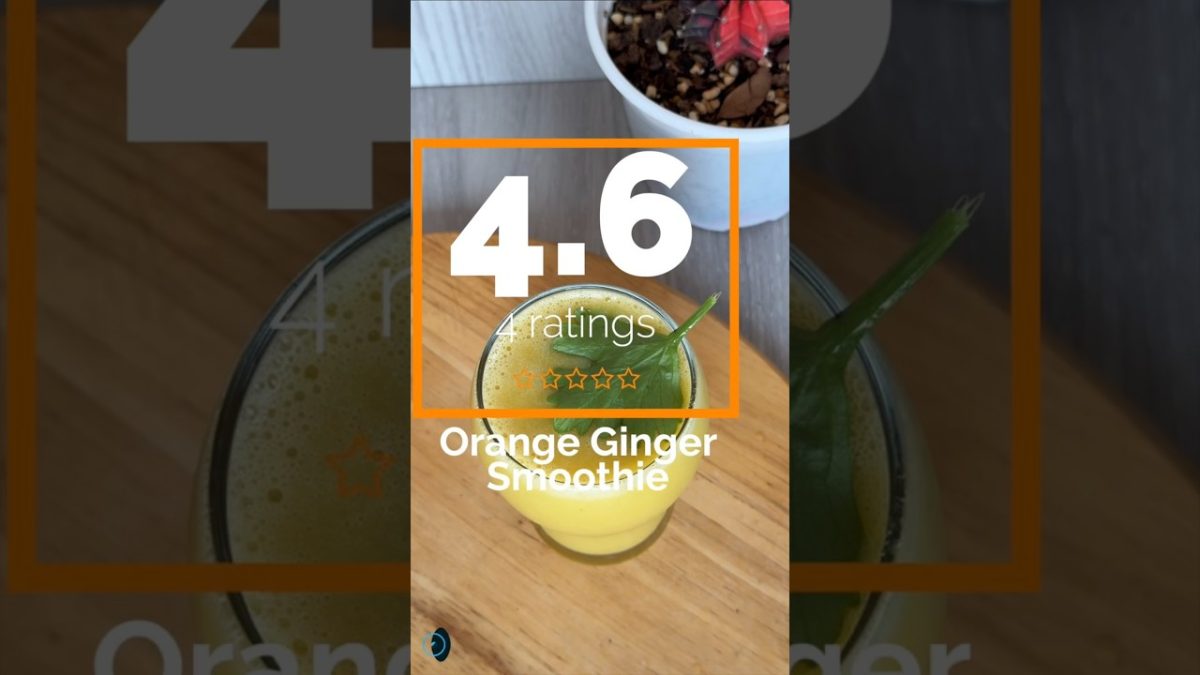Orange and Ginger Smoothie. Immune Bomb.
Ginger, a widely used root in culinary and traditional medicine, offers several properties that may contribute to immune system support. Here’s a structured overview of its potential immune-boosting mechanisms and considerations:
### Key Immune-Boosting Properties of Ginger:
1. **Antioxidant Activity**:
– **Gingerol**: The primary bioactive compound in ginger, gingerol, neutralizes free radicals, reducing oxidative stress. This helps protect immune cells from damage, maintaining their efficiency in combating pathogens.
2. **Anti-Inflammatory Effects**:
– Chronic inflammation can impair immune function. Ginger’s anti-inflammatory properties, mediated by gingerol and related compounds, may mitigate excessive inflammation, allowing the immune system to respond more effectively to infections.
3. **Antimicrobial Action**:
– Ginger exhibits antimicrobial activity against certain bacteria (e.g., *E. coli*, *Staphylococcus*) and viruses (e.g., respiratory syncytial virus). This direct pathogen inhibition may reduce the burden on the immune system.
4. **Gut Health Support**:
– By aiding digestion and reducing nausea, ginger promotes a healthy gut microbiome. Since ~70% of immune cells reside in the gut, this supports overall immune function.
5. **Thermogenic Effect**:
– Ginger may induce mild thermogenesis, potentially creating an unfavorable environment for pathogens, akin to a fever response.
6. **Nutrient Content**:
– Contains modest amounts of vitamin C, magnesium, and zinc, which contribute to immune health, though not in significant quantities compared to other sources.
### Practical Consumption Tips:
– **Forms**: Fresh ginger (highest gingerol content), tea, powdered, or supplements.
– **Recipes**: Add to smoothies, soups, stir-fries, or brew as tea with lemon and honey.
### Safety Considerations:
– **Dosage**: Moderate intake is generally safe. Excessive amounts may cause heartburn or digestive discomfort.
– **Interactions**: May interact with blood thinners (e.g., warfarin); consult a healthcare provider if on medication.
– **Pregnancy**: Limited amounts are safe, but high doses should be avoided without medical advice.
### Conclusion:
While ginger shows promise in supporting immunity through multiple pathways, it should complement—not replace—a balanced diet, adequate sleep, and other healthy habits. Human studies are limited, and more research is needed to confirm its efficacy. Incorporate ginger as part of a holistic approach to wellness.
Oranges are a fantastic source of vitamins, particularly vitamin C. They are known for their high content of this essential nutrient, which plays a crucial role in boosting the immune system, helping the body absorb iron, and acting as an antioxidant.
Here’s a breakdown of the key vitamins in an orange:
1. **Vitamin C**: Oranges are famous for their vitamin C content. A medium-sized orange provides around 70 mg of vitamin C, which is more than enough to meet the daily recommended intake for most people.
2. **Vitamin A**: Oranges also contain beta-carotene, which the body converts into vitamin A. This vitamin is important for good vision, immune function, and skin health.
3. **Vitamin B-complex**: Oranges contain several B vitamins, including B1 (thiamine), B9 (folate), and B5 (pantothenic acid), all of which help with energy production, metabolism, and maintaining healthy skin, hair, and eyes.
4. **Vitamin E**: While in smaller amounts, oranges do contain vitamin E, an antioxidant that helps protect cells from damage.
Including oranges in your diet is an easy and tasty way to boost your vitamin intake!
#smoothie #smoothies #smoothierecipes
source

